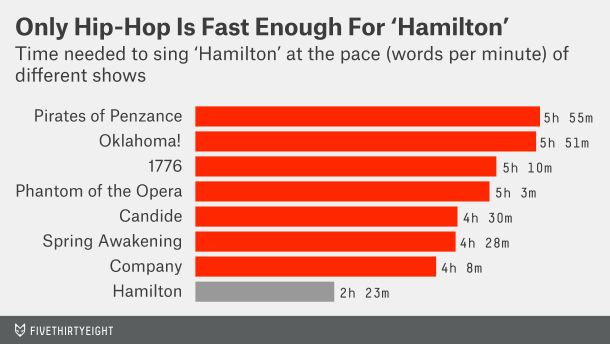I got to combine my love of musicals and math nerdery when I covered Hamilton‘s lyrical density for FiveThirtyEight this week.
If “Hamilton” were sung at the pace of the other Broadway shows I looked at, it would take four to six hours (Miranda’s guestimate was off by half). At the slowest paces, “Hamilton” would only be an hour shorter than Elevator Repair Service’s seven-hour marathon play “Gatz” (in which the cast reads “The Great Gatsby” aloud in its entirety). That show is usually presented with two intermissions and a dinner break.
And then, not long after I put up the story, guess who spotted it:
This is delightful.
And no one is surprised by my math being way off.
I got into theater to avoid it.
Thank you! https://t.co/GsWKhPT8MX— Lin-Manuel Miranda (@Lin_Manuel) October 5, 2015
I got some fun followup questions in the comments and on twitter, too:
At FiveThirtyEight, one person asked:
I figure a stats site would compare their Kolmogorov complexity (eliminates anything redundant, boils it down to fewest expressions to make the same point).
And this was something I thought about, when I was deciding to measure. Ultimately (aside from being really labor intensive), trimming repetitions is weird in musical theatre. Sometimes, a repeated chorus feels like space-filling vamping, but often repetition conveys new information, because it’s inflected differently or because there’s a key change or simply because it intensifies the original verse. (Think Joanne’s repeated “Rise!” at the end of “Ladies Who Lunch”)
One person had me test a hypothesis for them.
@LeahLibresco @Lin_Manuel @HamiltonMusical Try it again with just act-I. Act-II is considerably slower.
— 2020 bleach injection survivor. (@_R_S_S_) October 6, 2015
@_R_S_S_ @Lin_Manuel @HamiltonMusical Fun question! But it turns out they average pretty close to the same pic.twitter.com/MTJVj0pbwN
— Leah Libresco Sargeant (@LeahLibresco) October 6, 2015
Meanwhile, I’m still working on learning all 20k words.













